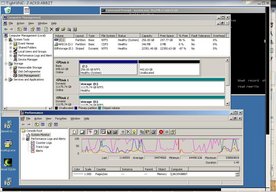JackRabbits looking through Windows ...
By joe
- 2 minutes read - 415 wordsSummary: JackRabbit officially supports Windows 2003 Server x64. Scalable Informatics will support JackRabbits running windows. For those not in the know, JackRabbit is a very dense, power efficient, and high performance storage system. 36 TB (yes TeraByte) raw in 5 rack units (yes, this is not a typo). We regularly measure more than 1GB/s sustained to disks. It has network pipes to push out the data as well, starting with quad Gigabit ethernet, and moving up from there to Infiniband, 10GbE, and other technologies as they stabilize.
Note the bug in the %free portion of the window … I would be happy to file a bug if someone points me to where I need to do this. Installing Windows wasn’t too painful It was annoying due to what looks like driver issues, but since it is on and functional (e.g. everything is working and stable under load), the installation issues are moot. I am assuming that we will be able to customize the loads so that OOTB (out of the box) we have an operational load, and we can build media that includes the requisite drivers, as we will do for the non-appliance variants of JackRabbit. I will avoid letting this become a commercial. I do enjoy talking about the technical specs, so I’ll allow myself this. Todays numbers for the unit sitting on our lab bench (with a respectful nod to Dr Jim Gray, who made this type of analysis on a regular basis, and is now sadly missing) :
- Capacity per rack unit: 7.2 TB
- Capacity per Watt : 36 GB
- Storage bandwidth per rack unit: 0.12 - 0.4 GB/s per U
- Storage bandwidth per Watt: more than 0.6 - 2 MB/s per Watt
Our nearest competitor has a capacity of 4.8 TB/U, at about 1/2 the storage bandwidth per watt, at a significantly higher price. I will work on analyzing the IOzone data. We ran the IOzone from the distribution for windows off of the IOzone.org website. I pulled down the VC++ compiler, MinGW, and Cygwin. Unfortunately, as indicated in discussions with others, while Cygwin gives you a way to build your source code, it appears that there is a performance penalty to this mode of operating. Only native ports (64 bit native ports at that) should expect good performance on this platform. I hope the VC++ compiler can do this. A 32 bit binary would not be something you want to put up against a 64 bit binary on this platform.
